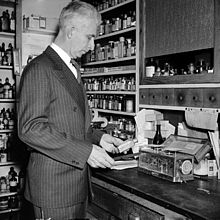Carl Thomas Durham (August 28, 1892 – April 29, 1974) was an American politician who served as a member of the United States House of Representatives from North Carolina.
Carl T. Durham | |
|---|---|
 | |
| Member of the U.S. House of Representatives from North Carolina's 6th district | |
| In office January 3, 1939 – January 3, 1961 | |
| Preceded by | William B. Umstead |
| Succeeded by | Horace R. Kornegay |
| Personal details | |
| Born | Carl Thomas Durham August 28, 1892 Orange County, North Carolina, U.S. |
| Died | April 29, 1974 (aged 81) Durham, North Carolina, U.S. |
| Political party | Democratic |
| Alma mater | University of North Carolina at Chapel Hill |
| Occupation | pharmacist |
Early life and education
editBorn in Orange County, North Carolina, Durham attended the University of North Carolina at Chapel Hill.
Career
editHe was a pharmacist from 1912 to 1938. He served as a pharmacist's mate in the United States Navy from 1917 to 1918. He served as a member of the city council of Chapel Hill, North Carolina from 1924 to 1932, and of the Orange County Board of Commissioners 1932 to 1938. He served as a member of the school board of Chapel Hill, North Carolina from 1924 to 1938. He was also a trustee of the University of North Carolina.
Durham was elected as a Democrat to the Seventy-sixth and to the ten succeeding Congresses (January 3, 1939 – January 3, 1961). He served as chairman of the Joint Committee on Atomic Energy, during which time he was a signatory to the 1956 Southern Manifesto that opposed the desegregation of public schools ordered by the Supreme Court in Brown v. Board of Education. He was not a candidate for renomination in 1960 to the Eighty-seventh Congress. In 1964, retired and resided in Chapel Hill, North Carolina.
Death
editHe died in Durham, North Carolina, April 29, 1974. He was interred in Antioch Baptist Church Cemetery, Chapel Hill, North Carolina.
Sources
edit- United States Congress. "Carl T. Durham (id: D000571)". Biographical Directory of the United States Congress.